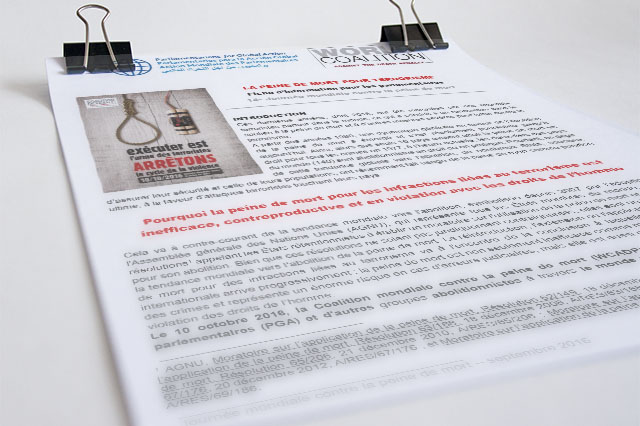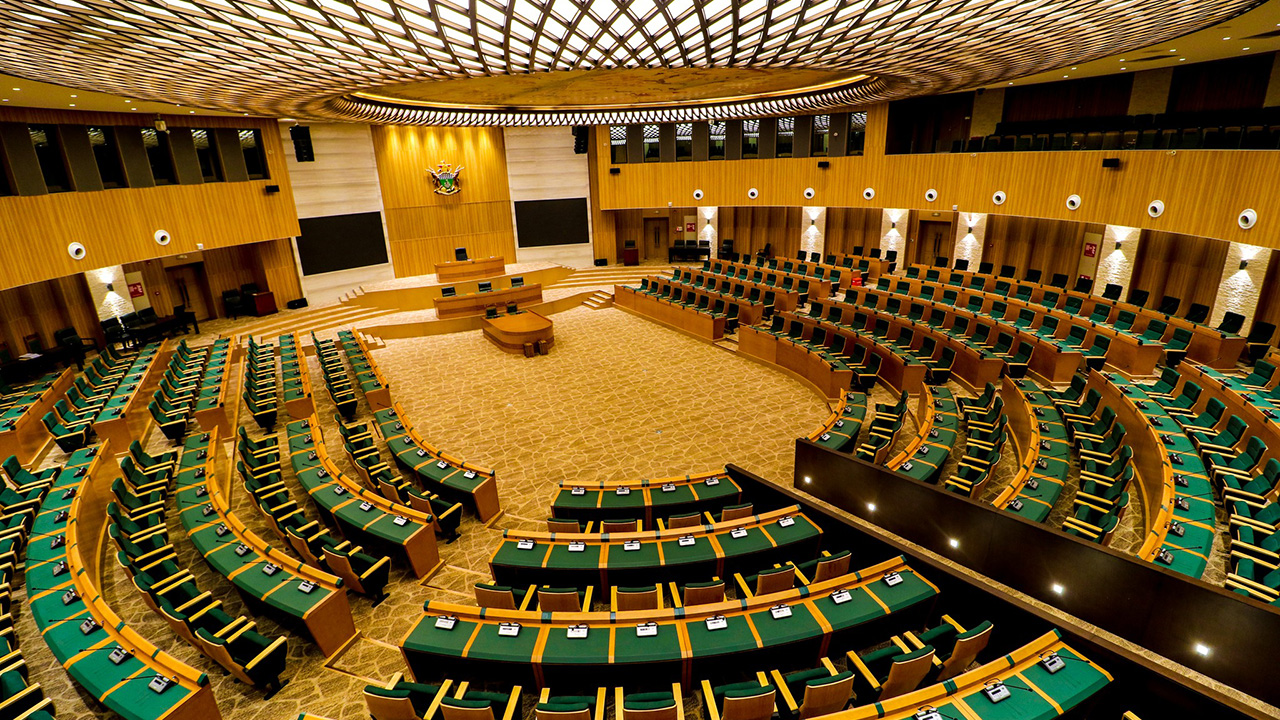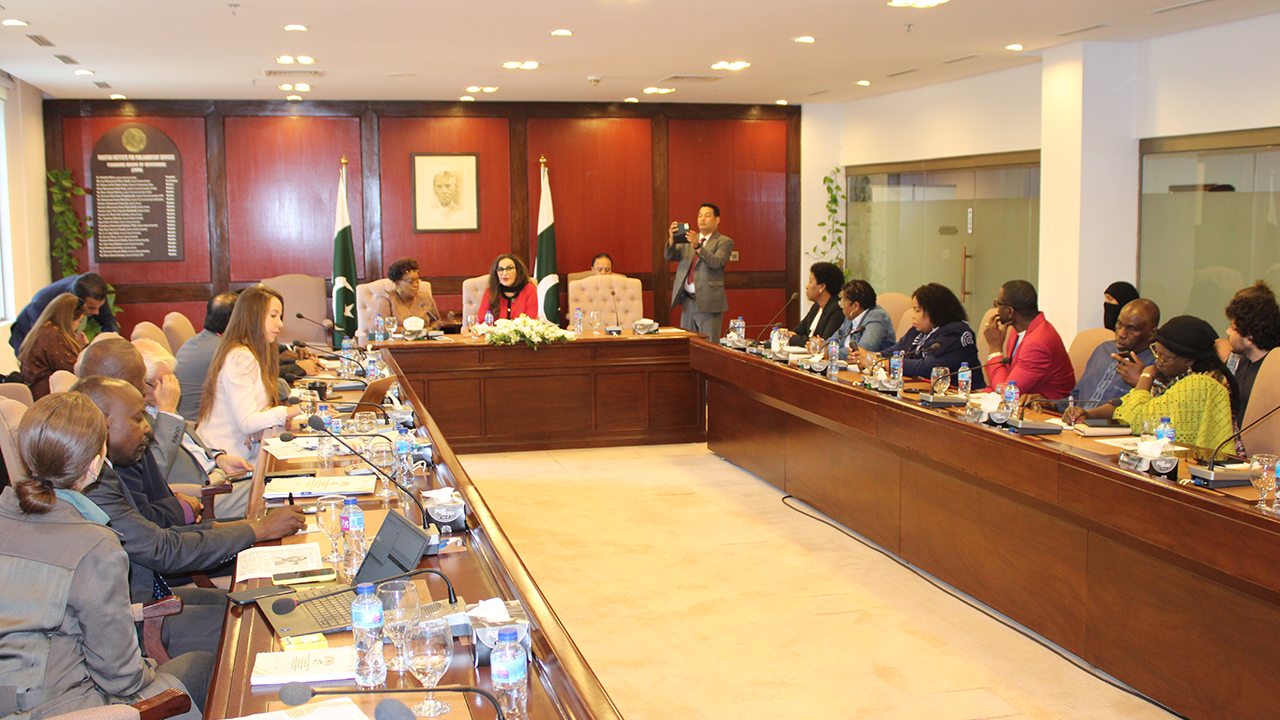
Parliamentarians for Global Action (PGA), in consultation with the World Coalition against the Death Penalty (WCADP), is launching today a Parliamentary Factsheet on the Death Penalty and Terrorism-Related Offences.
10 October 2016 marks the 14th World Day against the Death Penalty and today PGA, WCADP, and other abolitionists worldwide draw attention to the particular issue of capital punishment for terrorist offences. Often regarded as ‘heinous’ crimes, the terrorist nature – real or alleged - of certain criminal acts is easily used to justify restrictions or violations of human rights, including the right to life.
In the last ten years, some States have adopted laws that expand the scope of the death penalty, adding certain terrorist acts to the list of crimes punishable by death. Other States have resumed executions in the name of the fight against terrorism, putting an end to moratoriums that had lasted for years. PGA created this parliamentary factsheet to help legislators around the world to take action against the death penalty for terrorism-related offences.
Through drafting legislation and deliberating on national policies, Parliamentarians have a crucial role to play in the movement to restrict the use of the death penalty, generally and in particular for offences characterised as terrorism, and ultimately abolish it. The involvement of Parliamentarians in public debates can encourage a change in public understanding of the capital punishment and debunk misconceptions about its effectiveness in crime prevention.
I am confident that this Parliamentary Factsheet on the Death Penalty and Terrorism-Related Offences will become an important resource document for members of parliament worldwide, advocating for human rights. As the largest transnational network of individual parliamentarians committed to human rights, PGA is ideally placed to mobilize members of parliament to contribute to the global effort to abolish the death penalty. Ms Barbara Lochbihler, Member of the European Parliament (Germany),
Vice-Chair of the Human Rights Sub-Committee; Member of PGA Executive Committee and Convenor of the International Law and Human Rights Program
I wholeheartedly welcome the publication of the PGA Parliamentary Factsheet on the Death Penalty and Terrorism-Related Offences. With the upcoming vote at the United Nations General Assembly for a global moratorium on the death penalty, this will be a valuable tool in highlighting the ineffective nature of the death penalty. I am sure that this Guidebook will become essential reading for members of parliament around the world. Hon Kula Segaran, Member of the House of Representatives (Malaysia);
Member of PGA Executive Committee, Deputy Convenor of the International Law and Human Rights Program
Members of parliament in all UN Member States must do all what they can to end the use of capital punishments, especially for terrorism. In publishing this Parliamentary Factsheet, PGA has done an enormous service in providing to MPs worldwide with vital guidance on how to achieve this goal. My country, Togo, just acceded to the Second Optional Protocol to the International Covenant on Civil and Political Rights, the only universal international treaty which is designed to abolish the death penalty. I hope this factsheet will inspire other countries considering reinstating the death penalty to, instead, join us in our commitment to remain abolitionist. Hon. Jean-Joël Kissi, Member of the National Assembly (Togo),
Chairman of the Committee on Foreign Relations and Cooperation; Member of PGA
I welcome with great interest the publication of this Parliamentary Factsheet on the Death Penalty and Terrorism-Related Offences. As a Chadian parliamentarian and citizen, I know very well how terrorist groups affect the life of a whole country for the worse but I am also convinced that carrying out executions, as done by my government, does not deter future attacks. I will make sure to share this very useful tool with my peers in parliament and hope that it will help them better understand that the capital punishment is not effective, even for fighting terrorist groups such as Boko Haram. Hon. Théophile Yombombé, Member of the National Assembly (Chad);
Member of PGA
Pakistan enjoyed a moratorium on executions until 2014 when the death penalty was reactivated to fight terrorism. Now, our country is known as one of the biggest executioners in the world. As a parliamentarian, I will make good use of this Factsheet and engage with my colleagues in Parliament to renew Pakistan’s commitment to human rights and the abolition of the death penalty. Hon. Naveed Qamar, Member of the National Assembly (Pakistan);
Member of PGA’s Executive Committee




